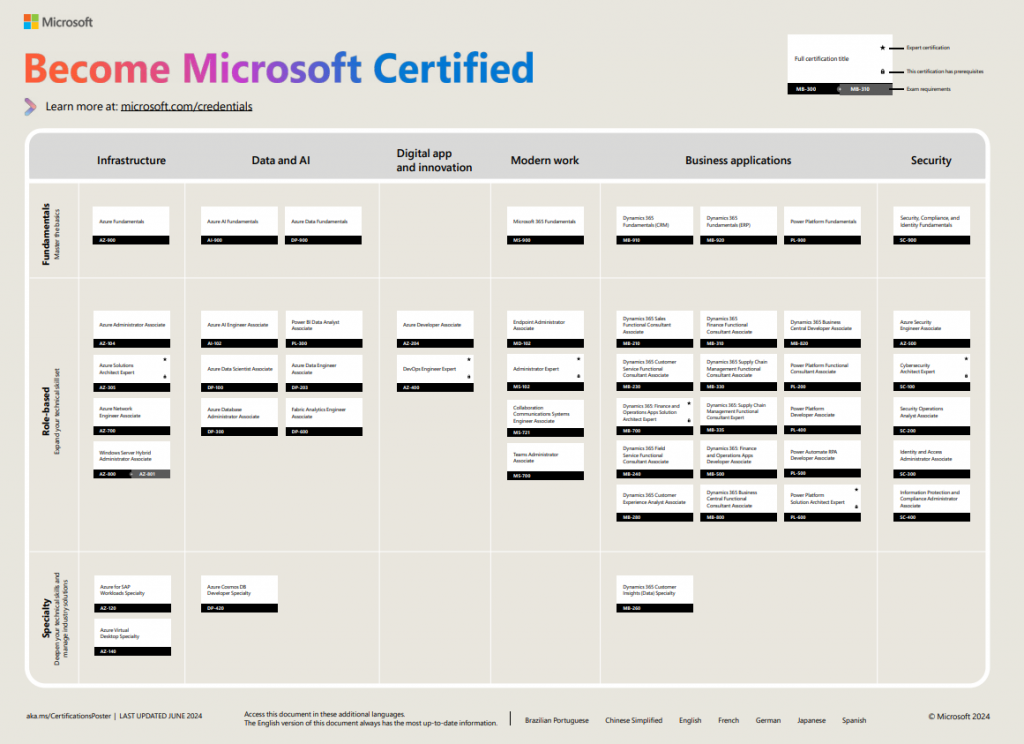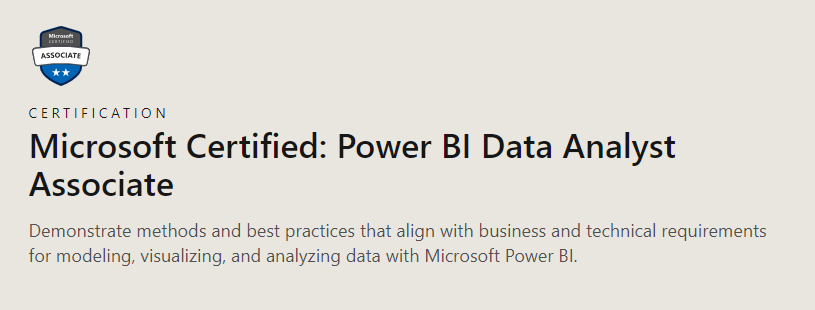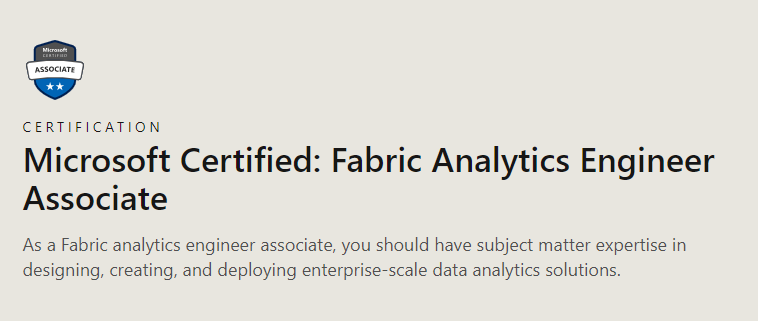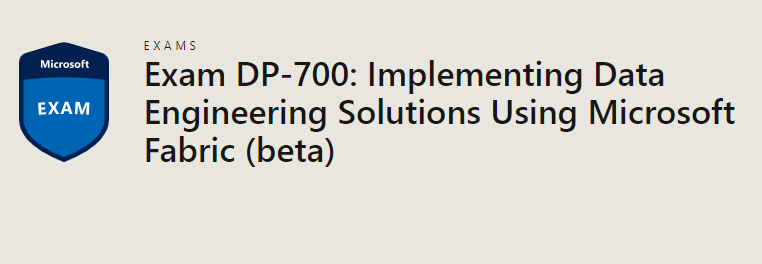
If you want to get Microsoft certifications in the Fabric and Power BI space, there have been some changes in the past few years, especially with the changes in technology. In this blog and video, I’ll explain the current certifications in this area and what is covered in each.
Video
Why certifications?
The first question that you may ask yourself is, what is a Microsoft certification, and why do you need it?
Microsoft certifications are considered a structured learning path for different Microsoft technologies. By passing specific exams in each technology area, you get certified. Being certified can show your expertise, experience, and knowledge *to some degree* to the recruitment company. And it might help you to land your data analytics job easier. Another pro of getting certified is to be up-to-date with the technology even though some regions of it are something you don’t work on a day-to-day basis.

Some of Microsoft certifications. Source: https://query.prod.cms.rt.microsoft.com/cms/api/am/binary/RE2PjDI
Although getting certified can help in recruitment and career progress, it is not enough. Often, you will need to pass a technical interview and demonstrate your technical abilities in the technology. So if your aim in getting certified is passing the exams and doing no real-world experience, then you will still have a hard time in career progression.
Power BI Data Analyst Associate: PL300
We have one main certification in Power BI, Power BI Data Analyst Associate. This certification can be achieved by passing one exam: PL300. This exam assesses your skillset in Power BI. If you are a Power BI-only user, this is an exam for you. The exam is designed to assess your knowledge of different aspects of Power BI technology, from building the solution to hosting it and sharing it with the end users.

Here are the skills assessed in this exam;
- Prepare the data (25–30%)
- Model the data (25–30%)
- Visualize and analyze the data (25–30%)
- Manage and secure Power BI (15–20%)
Prepare the data, including connecting to data sources and using Power Query for data transformation and preparation.
Modeling the data includes not only the star schema design but also calculations, DAX, and some optimization techniques.
Visualizing and analyzing data includes assessing your knowledge of report visualization, story telling, and some best practices of visualization.
Manage and secure Power BI includes all the aspects related to publishing your Power BI file to workspaces, sharing it with users, security, governance, deployment, etc.
For passing PL300, you don’t need to know any other technology but Power BI. You won’t need to know Excel, databases, or even SQL. This exam assesses whether you are comfortable using only Power BI as the data analysis tool to build your analytics project.
Fabric Analytics Engineer Associate: DP600
If you are stepping up into Fabric, which includes not only Power BI but also data engineering, data warehousing, and many other aspects, then there is another certification for it, called Fabric Analytics Engineer Associate. You can get certified by passing one exam: DP600.

This exam is still relatively new, and here are the skills assessed through it;
- Plan, implement, and manage a solution for data analytics (10–15%)
- Prepare and serve data (40–45%)
- Implement and manage semantic models (20–25%)
- Explore and analyze data (20–25%)
This exam goes beyond just Power BI. You will need to know about data engineering, data warehousing, and some of the more advanced concepts of building a data analytics solution.
Planning, implementing, and managing a data analytics solution will assess some of the fundamentals of an analytical solution in Microsoft Fabric. Aspects such as licensing, environment and workspace setup, best practices such as templates, governance, deployment, re-usable components such as project files, and anything else needed for managing the analytics solution in Microsoft Fabric are included here.
Prepare and serve data includes data storage objects such as Warehouse and Lakehouse, The transformation and ingestion technologies to load data into those, which are Data Factory Pipelines and Dataflows, and data transformation techniques as well as optimization processes.
Implement and manage semantic models is the Power BI side of this exam. This is where your knowledge of Power BI semantic model, tables and relationships, DAX and calculations, and tips for working on larger data models and optimization techniques will be assessed.
Explore and analyze data includes ways to analyze data in Fabric from the Warehouse, Lakehouse, or model, either by SQL Analytics endpoint and using SQL or XMLA endpoint and some knowledge of DMVs.
Microsoft Fabric is a wide technology suite; however, DP600 mainly focuses on Data Integration (Data Factory), Data Engineering, Data Warehousing, and Power BI. Real-time intelligence and data science are parts of Fabric left out of this exam.
DP-700: Implementing Data Engineering Solutions Using Microsoft Fabric
This is the most recent exam for Microsoft Fabric. This exam isn’t available yet. It will be available on the 22nd of October 2024, and it is still a beta exam, so changes will likely happen for this exam. This exam is designed to cover areas that DP600 didn’t cover, especially on Kusto Query Language (KQL), SQL, and PySpark.

Skills measured for this exam are:
- Implement and manage an analytics solution (30–35%)
- Ingest and transform data (30–35%)
- Monitor and optimize an analytics solution (30–35%)
Implementing and managing an analytics solution may include deployment, environment setup, Notebooks, Spark pool configuration etc., plus governance, sharing, and workspace setup in the service.
Ingest and transform data not only includes Data Factory, in my view, but perhaps also Event Stream and some of the transformations available there before passing data to a KQL destination.
Monitoring and optimizing an analytics solution will most likely include assessing your knowledge of KQL and SQL as query languages and using them to analyze data, plus everything else related to optimizing data engineering aspects.
This is a very recent exam; no one has even taken it yet, so we don’t know what happens after this exam comes out of the Beta stage. Would it replace DP600, or will it complement that? My feeling is that DP600 and DP700 will both stay because it seems they are assessing different aspects of Fabric.
Summary
Getting certified doesn’t mean you are an expert in the field. It shows your interest, though, and it is a good way to assess your knowledge of Power BI and Fabric. The three exams available now have study materials on their Microsoft page. However, the best way to learn is to look at what skills are measured in each exam and then use resources here and there to learn about those.
The Power BI and Fabric training RADACAD provides will give you enough knowledge to pass these exams and more. Our website also has tons of articles and videos on our YouTube channel covering aspects measured in these exams. So study, have fun, and get certified.




